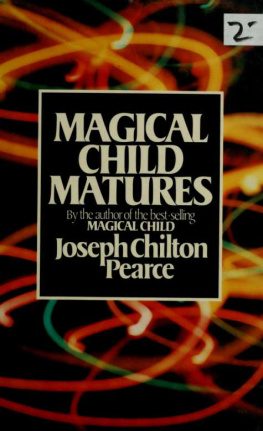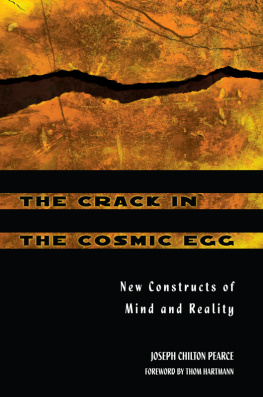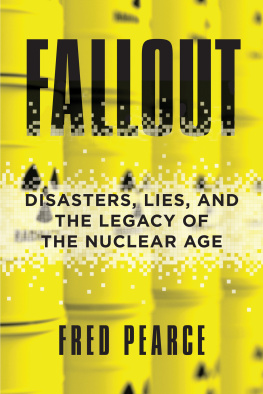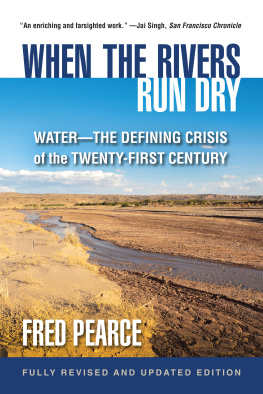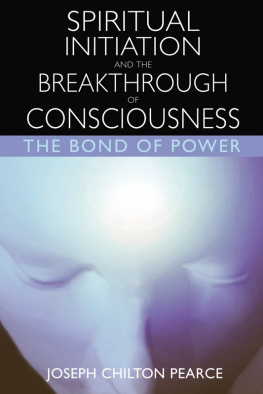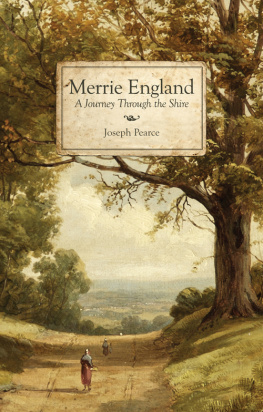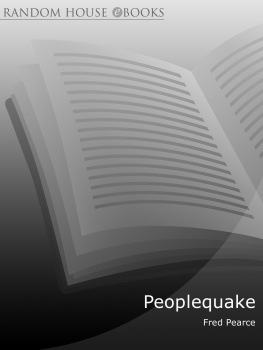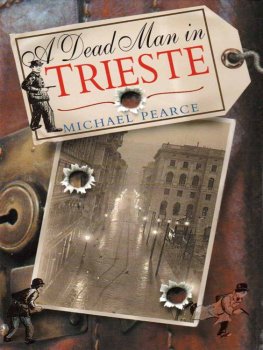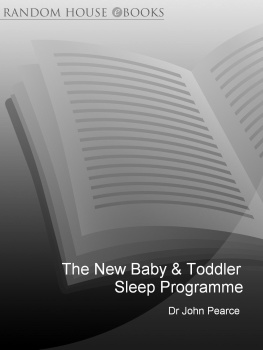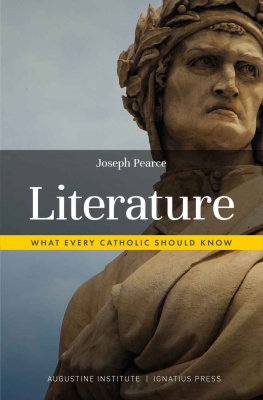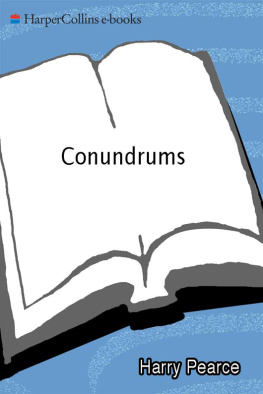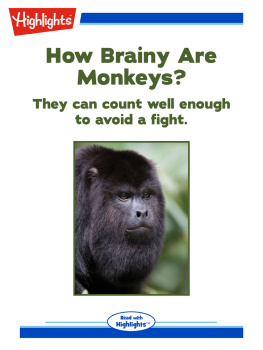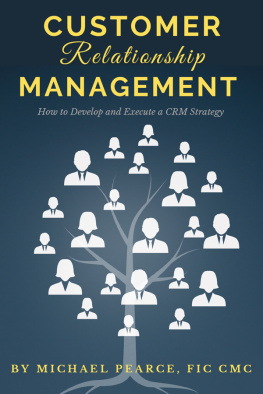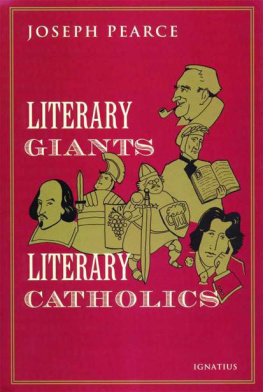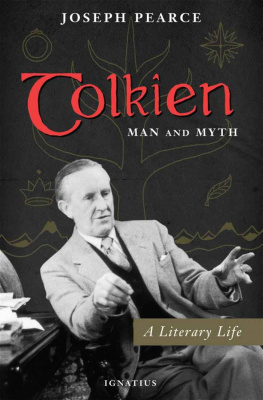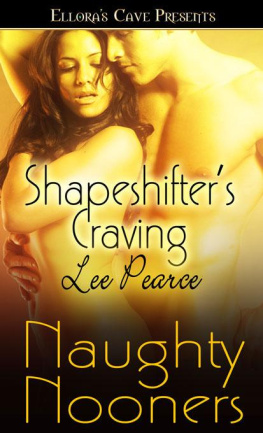Pearce - Magical child matures
Here you can read online Pearce - Magical child matures full text of the book (entire story) in english for free. Download pdf and epub, get meaning, cover and reviews about this ebook. year: 1985, publisher: New York : Dutton, genre: Home and family. Description of the work, (preface) as well as reviews are available. Best literature library LitArk.com created for fans of good reading and offers a wide selection of genres:
Romance novel
Science fiction
Adventure
Detective
Science
History
Home and family
Prose
Art
Politics
Computer
Non-fiction
Religion
Business
Children
Humor
Choose a favorite category and find really read worthwhile books. Enjoy immersion in the world of imagination, feel the emotions of the characters or learn something new for yourself, make an fascinating discovery.
- Book:Magical child matures
- Author:
- Publisher:New York : Dutton
- Genre:
- Year:1985
- Rating:4 / 5
- Favourites:Add to favourites
- Your mark:
- 80
- 1
- 2
- 3
- 4
- 5
Magical child matures: summary, description and annotation
We offer to read an annotation, description, summary or preface (depends on what the author of the book "Magical child matures" wrote himself). If you haven't found the necessary information about the book — write in the comments, we will try to find it.
Pearce: author's other books
Who wrote Magical child matures? Find out the surname, the name of the author of the book and a list of all author's works by series.
Magical child matures — read online for free the complete book (whole text) full work
Below is the text of the book, divided by pages. System saving the place of the last page read, allows you to conveniently read the book "Magical child matures" online for free, without having to search again every time where you left off. Put a bookmark, and you can go to the page where you finished reading at any time.
Font size:
Interval:
Bookmark:

This book made available by the Internet Archive.






If I could only live at the pitch that is near madness When everything is as it was in my childhood Violent, vivid, and of infinite possibility: That the sun and moon broke over my head.
Then I cast time out of the trees and fields, Then I stood immaculate in the Ego; Then I eyed the world with all delight, Reality was the perfection of my sight.
And time has big handles on the hands. Fields and trees a way of being themselves. I saw battalions of the race of mankind Standing stolid, demanding a moral answer.
I gave the moral answer and I died And into a realm of complexity came Where nothing is possible but necessity And the truth wailing there like a red babe.
RICHARD EBERHART
Collected Poems 1930-1960
New York, Oxford University Press, 1960
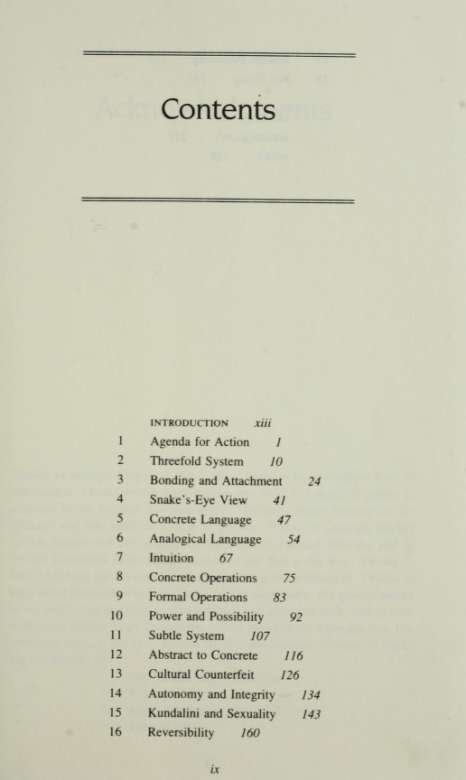
18 Not Doing 183
NOTES 197
BIBLIOGRAPHY 218
INDEX 228
Acknowledgments
Thanks to Marilyn Ferguson's Brain/Mind Bulletin for its endless flow of information. Thanks to the many people who have sent research papers in response to my lectures and workshops. Thanks to Minas Kafatos for his criticism and help with the section on physics. Thanks to Laurence Becker for his interest and for sending me the poem by Richard Eberhart, and to Oxford University Press for permission to use that poem here. Thanks to Bill Whitehead for his enormous help in editing this manuscript. Thanks to copy editor Raymond Van Over for his helpful suggestions. My greatest thanks to my meditation teachers, to whom I have dedicated this book, and to their worldwide Siddha Yoga Foundation for all the kindness extended me. For interested readers, the U.S. address for this organization, devoted to teaching meditation, is:
The Siddha Yoga Foundation
P. O. Box 600
South Fallsburgh, New York 12779
914/434-2000
Introduction
In the summer of my sixth year a great expectation arose within me; something overwhelming was pending. I was up each morning at dawn, rushed to the top of Dorchester Hill, a treeless knoll of grass and boulders, to await the sun, my heart pounding. A kind of numinous expectancy loomed everywhere about and within me. A precise shift of brain function was afoot; my biological system was preparing to shift my awareness from the pre-logical operations of the child to the operational logic of later childhood, and an awesome new dimension of life was ready to unfold. Instead, I was put in school that fall. (There was no kindergarten in my day and we went straight into first grade if we turned seven with the first semester.) All year I sat at that desk, stunned, wondering at such a fate, thinking over and over: Something was supposed to happen, and it wasn't this.
A similar sequence unfolded in my fourteenth year. A huge expectancy arose, more poignant and powerful than the earlier force. This was localized within my chest and what Thomas Wolfe spoke of as the "grape bursting in the throat." Again I was engulfed in the momentous feeling that something universal and awesome was pending. Puberty had unfolded at the same time, of course, and I found on every hand that this explosive longing of the heart
Xlll
^iv Introduction
was attributed to sexuality. Sex certainly exploded at that time, too, but it was not at all the same as that affair of the heart. This grape bursting in the throat was far more persistent than the earlier expectancy at age seven, but, as it turned out, not as persistent as sexuality. By my early twenties whatever was supposed to have happened long since had not, the feeling of expectancy slowly waned, and I was left with a sense of loss and despondency that sexual exploration did nothing to abate. The issue within had not been misplaced libido.
Today I speak to some 15,000 people a year, giving workshops and lectures, and I find a universal, unsung lament that summarizes most people's lives: "Something was supposed to happen but it didn't." We read the psychological studies concerning post-coital blues, depression following intercourse, and post-partum blues following childbirth, where as usual, something was supposed to happen but didn't. There are no studies of the post-adolescent blues because this ailment is generally our permanent state and accepted as our natural human condition.
Ten years ago, through working on my book Magical Child, I found a portion, at least, of what was supposed to happen as a child but had not. I felt relief, as long years of searching seemed to move toward culmination; outrage, for I found that we were vastly more than the behavioristic ideologists had taught us to believe about ourselves; and a renewed sense of expectancy, as though new chapters lay in store for my own life. As I was finishing the work, I had an encounter with a spiritual teacher, which Ilater described in my book The Bond of Power, and underwent such a dramatic, shaking experience that I felt impelled to withdraw from the worid of book-writing and lecturing; disappeared, in effect, and left no address. Something enormous had happened, more seemed pending, and my whole life centered on getting to the core of this event. After three years of this retreat and search, I fell fully into what I now call the post-biological stage of development, that which should have happened, or been initiated, in adolescence. A lifetime of bewildering questions began to be answered (though a new set arose) and I began to understand the self-pitying despondency of our eariy twenties, when we sense the gross shortchange of our lives and begin that incessant casting about to lay blame anywhere and everywhere. I understood why at about age twenty, even as I attempted to cover my sense of loss by knuckling down to play the game, get those degrees and credit cards, and take my place in the machine, such deep anger festered within me. Something was supposed to happen, and my sense of outrage was justifiable, for, as I found in my fifty-third year, what should have happened eariier is an astonishingly magnificent process.
Magical Child hinted at the great power inherent in our beings. What I
have learne d since the writing of that book is that such power is a post-bi-ological affair; th"edevebpment of these powers begins after weliave completed our physical maturation. When I wrotel[fagical ChildTknevrn^ of a post-biological development; I tried in that book to squeeze everything into the biological period of development of those first fifteen years, which I now realize was a limitation of that book. Because there is a serious discontinuity between the logic of our biological lives and that of our post-biological development, I look for analogies, for metaphors to help bridge the gap. Many of our activities and ideas offer analogies to our own internal states, however, since anything we produce is in some way a reflection of us.
Font size:
Interval:
Bookmark:
Similar books «Magical child matures»
Look at similar books to Magical child matures. We have selected literature similar in name and meaning in the hope of providing readers with more options to find new, interesting, not yet read works.
Discussion, reviews of the book Magical child matures and just readers' own opinions. Leave your comments, write what you think about the work, its meaning or the main characters. Specify what exactly you liked and what you didn't like, and why you think so.

